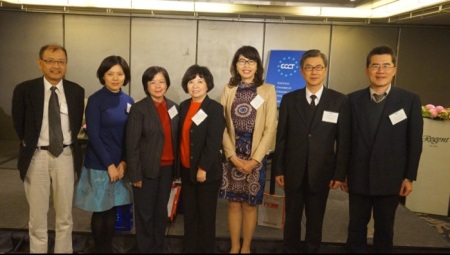Panel discussion on healthcare in Taiwan

On 11 March the ECCT's Healthcare Enhancement committee hosted a panel discussion on the future prospects for the healthcare system in Taiwan. The discussion was moderated by Michelle Lee, President of Common Health Magazine.The discussion covered a variety of subjects related to ensuring the future sustainability of Taiwan's national healthcare system in the face of challenges such as Taiwan's rapidly-aging society and the rising burden from non-communicable-diseases.
Taiwan is on track to be classified as a super-aged society (with 20% of the population over the age 65) by 2025. Even though the Long-Term Care Services Act cleared the legislature earlier this year and is expected to take effect in 2018 at the earliest, it only provides a legal framework for the integration of care services. The sources of funding have not yet been decided.
President-elect Tsai Ing-wen has said she plans to allocate NT$30 billion from taxes and NT$3 billion from the government's regular budget to build a long-term care system. Based on her campaign platform, Tsai proposes to spend up to NT$60 billion backed by tax revenue over eight years to support the services. However, even though overall public expenditure will continue to increase, it is generally believed that resources are unlikely to be sufficient to cover all costs.
Given increasing strains on the national health budget, panelists discussed ways to increase NHI resources. Options suggested included raising the integrated house and land sales tax and the inheritance and gift tax rather than general income tax, which would be more difficult.
However panelists agreed that these would only be stop-gap measures. Since the NHI resources will always be limited to some extent, there is a role for private insurance to play to make up for shortfalls in national health insurance (to cover costs not covered by NHI). However, the extent of the involvement of the private sector in providing healthcare is the subject of debate between proponents of a social-welfare based system and proponents of a market-based system. It can be argued that it should be left up to individuals to make their own decisions on how much cover they need based on their needs and financial ability. However, the use of private insurance is not without controversy. There has been a rise in the number of disputes between insurers and the insured whereby insurers have denied claims and refused compensation, citing clauses in insurance policy contracts.
For example, cancer treatments are becoming more advanced and innovative with various tools, including surgery. If a patient bought an insurance policy years ago, the policy may not cover new treatments. Panelists agreed therefore that insurance companies have an obligation to improve transparency and clearly explain the implications of their policy clauses to clients.
Awareness of and the use of private insurance is rising in line with the public's growing awareness of health issues as well as rising costs not covered by NHI. One example was cited by a panelist where only about 30% of the medical costs of a breast cancer patient were covered by the NHI in the first year. This meant that she had to have insurance or pay out of pocket to cover the other 70%. While percentages may vary depending on the type and severity of the illness, the case is instructive in that it highlights the potential for private insurance policies and that they need to be transparent.
Panelists discussed possible solutions to Taiwan's aging problem. To deal with aging patients, the idea was raised of enhancing community support systems (such as home-based or community-based care, facility-based assisted living and nursing homes) rather than hospitalizing patients.
Panelists also discussed the issue of waste. Too many patients are taking medications that they do not need or are not effective. Reducing waste would help to stretch the NHI budget further.
Panelists concluded that more education is needed to raise awareness in the general public that healthcare is an investment in oneself which should be taken just as seriously as other forms of investment. In addition, they agreed that all citizens should be encouraged to cherish the NHI system and not abuse it so that everyone can continue to benefit from the system.
